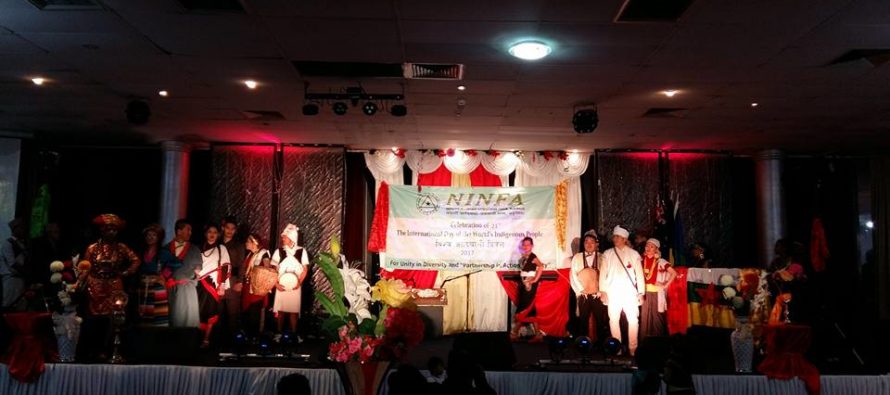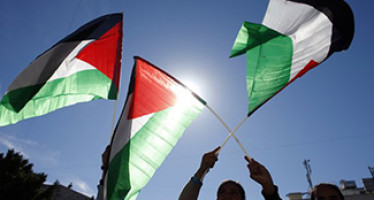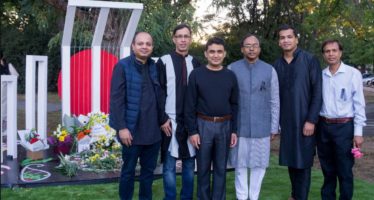NINFA’s celebration and some thoughts on Bangladesh

2017 International Day of World’s Indigenous Peoples by Nepal in Australia and some thoughts on Bangladesh
On 12 August 2017, the Nepalese Indigenous Nationalities Federation Australia (NINFA) celebrated the International Day of World’s Indigenous Peoples at Indreni Function Centre, Rockdale, Sydney. It was a splendid evening in a comfortable gathering of 250 to 300 people at the venue. It was a joy to see a constellation of two bright stars Hon. Linda Burney MP, an accomplished Australian leader with an aboriginal ancestry, and blazing Her Excellency Lucky Sherpa, Ambassador of Nepal, who assumed the post two months ago, surrounded by many other twinkling stars – distinguished guests and Nepali expats, including scholars, professionals, journalists, activists, artists and families. His Excellency Deepak Khadka, Honorary Consulate General of Nepal, a wonderful friend who I know for nearly 8/9 years, was there, as always, with his big heart.
Indigenous peoples in Nepal constitute about 36% of the total population. Nepal voted in favour of the United Nations Declaration on the Rights of Indigenous Peoples (UNDRIP), that was adopted in 2007 by the UN General Assembly.
The United Nations Declaration on the Rights of Indigenous Peoples (UNDRIP) is a comprehensive international declaration which does not add any new provisions for human rights, but it reinstates many rights already contained in the international human rights instruments and many of those rights which have been denied to indigenous peoples or taken away from them.
In 2007, Nepal also ratified ILO Convention 169 on Indigenous and Tribal Peoples. Nepal’s adoption and recognition of these international instruments are slowly bringing positive change enhancing indigenous peoples rights.
Recognition of the UNDRIP, which is feared by many countries in South Asia, including Bangladesh, with a false assumption that it may harm mainstream people’s rights, has proven to be untrue in Nepal. It has not taken away rights of mainstream Nepalese. There is now a greater chance for Nepal for a meaningful development with informed and full participation of its indigenous peoples.
In 1972, Bangladesh ratified ILO Convention 107 – Indigenous and Tribal Populations Convention 1957, which enables Bangladesh to establish some rights of indigenous peoples, whether they are termed as indigenous, tribals or others (hill people or the new derogatory term ‘small ethnic groups’). Bangladesh also pledged to ratify ILO Convention 169 on Indigenous and Tribal Peoples in its Seventh Five Year Plan for FY2016 to FY2020. It also ensures legal protection by implementing the UNDRIP. While there is a growing public support for indigenous rights in Bangladesh which is visible in public meetings, mainstream and social media, in 2009, Seikh Hasina, the Prime Minister of Bangladesh, sent message and gave words on 9 August, on the International Day of World’s Indigenous Peoples, that the Government will implement the 1997 Chittagong Hill Tracts Accord and the guidelines of the UNDRIP. The 2009 assurance of Prime Minister Hasina and many recent policies, including the Seventh Five Year Plan, hold hope for Bangladesh to work for an indigenous rights friendly country to walk together with its indigenous peoples, one of the most vulnerable groups in the country, for human rights, justice and development. Development of any country, without equality and justice, can’t be a meaningful development. It can also ensures sustainable peace and prosperity of a country. Now Bangladesh, like Nepal, is working on National Action Plan to implement the United Nations Sustainable Development Goals (SDGs). There is concern in home and abroad that indigenous peoples of Bangladesh are yet to be consulted and engaged in this process in the spirit of the sustainable development agenda 2030 which is ‘leave no one behind’.
The evening gave me an opportunity to catch up and enjoy the Nepalese celebration of the International Day of World’s Indigenous Peoples with Ganesh Tamang, one of the founding members, ex-President and a driving force of the NINFA, and his wife Sonali, Arun K. Tamang, the new President, who is a brilliant football player and organiser, Lil Gurung, Seema, Shashi Rai and others, who have been playing big parts in NINFA.
Her Excellency Ms Sherpa is an inspiring talented indigenous woman who studied Economics and was an ex-MP. I learnt from Ambassador Sherpa that she knows and worked with Bangladeshi Chandra Kalindi Roy, Chief of the Secretariat of the United Nations Permanent Forum on Indigenous Issues (UNPFII), Chakma Raja Devasish Roy-Wangza, 2014-2016 Vice-Chair and Expert Member of the UNPFII. I also learnt from my CHT Indigenous Jumma Association (CHTIJAA) colleague and former ILO official Abhilash Tripura that he was with her in a panel in an August 2009 international seminar at Delhi on Adivasis organised by a think tank with UN organisations and the Government of India, attended by Mr. Hamid Ansari, the then Vice President of India. I mentioned my indomitable Nepali activist friends Rita Thapa, a founding member of Tewa, Lily Thapa, a founding member of Women for Human Rights, Shobha Gautam, a senior journalist and activist, to the Ambassador. She knows them. It was fascinating to see a spontaneous and strong public engagement capacity of the Ambassador. Public engagement was also strong, but different during two previous illustrious Nepal Ambassadors with who I had the opportunity to attend some events. Now there is a special feminine strength which is undeniable. I am humbled to be invited by NINFA for many years in their beautiful events and for the opportunity to exchange our ideas and views. We are looking forward to a friendly soccer match (football) between adivasi Nepal and adivasi Bangladesh soon. Cultural performance of 11 indigenous groups living in Sydney, with their fabulous costumes, songs, and dance, highlighting rich cultural diversity of Nepal, was spectacular.
Before getting home, the evening ended with a warm Bangladeshi hospitality when I stopped to buy petrol at a Bangladeshi expatriate Touhid’s petrol station. A graduate of Bangladesh Institute of Technology, Rajshahi, Touhid is also a writer which I learnt in an earlier visit when I noticed his Bangla writings in the computer screen. A shy man, he couldn’t answer simple ‘yes’ or ‘no’ to my brief enquiry – whether he is a writer. During a number of visits, as I buy petrol from the station when it is on my way, I learnt that he has a Kolkata publisher and has been struggling to finish the work. I briefly warned him to finish it soon, otherwise I will keep on abusing him by asking about the completion. There were always customers waiting to pay after me. But, that evening he had time to come out to offer me a bottle of Coke from the shop fridge, and because I don’t drink any soft drinks, he succeeded to hand me a cold bottle of water before running back to serve a waiting customer. His point was that he hardly sees any Bangladeshis in the shop and has no opportunity to be a host. His hospitality reminded me of warm hospitality and care in my Bengali friends’ homes in Bangladesh during my student days. It was a memorable evening with wonderful experience with people of diversity from two South Asian countries, Bangladesh and Nepal, in Australia.
Hon. Linda Barney declared her visit to Nepal in November this year with an aim to learn more about situation of indigenous rights in Nepal. She gave assurance to take concerning issues of Nepalese Australians to the Parliament of Australia. Chief guests and other speakers raised demand and concern for success in the ongoing process of constitutional recognition of indigenous Australians. NINFA deserves congratulations for a successful 10th celebration of the International Day of World’s Indigenous Peoples with determination and hope in establishing indigenous rights.
Related Articles
UN Vote for Palestine resolution snubs Israel and the US
Palestine resolution for admission into the UN as an “observer non-member state” was adopted on 29th December by a huge
একি দেউলিয়ার রাজনীতি , নাকি রাজনীতির দেউলিয়াত্ব
১. মিথ্যের , চাপাবাজির কিংবা তেলমারার ও একটি নির্দিষ্ট সীমারেখা ও গ্রামার থাকা উচিত কিংবা দরকার রয়েছে । কিন্তু বি
কেনবেরার ২০১৯ সালের প্রভাতফেরি পৃথিবীর সকল বাংলাদেশ দুতাবাসের জন্য অনুকরনীয় হতে পারে
কেনবেরায় এবারই প্রথমবারের মত বিভিন্ন ভাষাভাষির মানুষ একত্রিত হয়ে ২১ ফেব্রূয়ারি ২০১৯-এর সকালে প্রভাতফেরি’র হাটায় অংশ নিয়েছিল । বাঙ্গালী অবাঙ্গালী









